Who We Help
Meet some of the individuals, including veterans and their families, whose lives we have helped to transform.
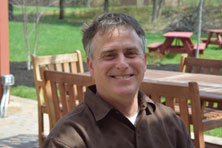
David, Iraq War Veteran
David, Iraq War Veteran
 Growing up, David recalls always having a sense of service to community and country from his days in the Boys Scouts and his family members who served in the military. When he enlisted and trained at Fort Benning, he excelled. “I put a lot of effort into my military training and service,” he recalls. ” I liked what I did.” He would spend 20 years in the U.S. military.
Growing up, David recalls always having a sense of service to community and country from his days in the Boys Scouts and his family members who served in the military. When he enlisted and trained at Fort Benning, he excelled. “I put a lot of effort into my military training and service,” he recalls. ” I liked what I did.” He would spend 20 years in the U.S. military.
But Iraq was tough. He served there in 2005 on the gunnery trucks protecting the military convoys. “It was a very nervous place,” he says. “IED’s would strike one of our trucks several times a week and we all experienced a fair share of shocks from them and even at base camp, mortars would land in our perimeters several times a day five or six days out of the week.” He adds that it was “awfully hot” with temperatures above 110 degrees wearing very heavy ballistic armor. Still, he served a second tour there in 2010.
Years of combat caught up with David after his final tour: Feeling anxious, trouble sleeping, drinking, overly cautious with driving and other everyday routines. Within two years, he lost his apartment, his depression and anxiety worsened and he started feeling isolated. “My old friends had their own lives, their jobs and their families.” He was in a VA program when he learned of the opening of Valley Brook Village. “It’s been great ever since I moved here. I have a beautiful place to live that’s peaceful. The VA services are right here on campus. And I’m around other vets. We can identify with the things we’ve all been through. They are people you can trust, people who have your back.”
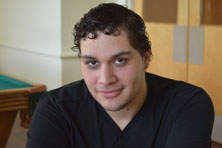
Ruben, Afghanistan War Veteran
Ruben, Afghanistan War Veteran
 It’s not difficult to understand how someone like Ruben could end up homeless. He’s only 25 years old. He was young when he went into the service out of high school.After 4 years of military service and war, he was honorably discharged for medical reasons, walking with the aid of a cane and struggling with depression and PTSD from his combat service in Afghanistan. “The military breaks you down to build you up and it works for what you are doing in wartime but once you are back in the real world, it’s confusing,” he says. “The infantry doesn’t train you well for the job market.”
It’s not difficult to understand how someone like Ruben could end up homeless. He’s only 25 years old. He was young when he went into the service out of high school.After 4 years of military service and war, he was honorably discharged for medical reasons, walking with the aid of a cane and struggling with depression and PTSD from his combat service in Afghanistan. “The military breaks you down to build you up and it works for what you are doing in wartime but once you are back in the real world, it’s confusing,” he says. “The infantry doesn’t train you well for the job market.”
Ending up homeless he describes as a “very dehumanizing factor.”
After a suicide attempt and stay in a VA program, he entered Hope for Veterans where he has been for the past year. “I desperately needed to come here and be able to transition back to civilian life,” he confides. “As veterans we support each other. We’re a community. It’s an environment where people understand each other.”
He attributes his Community Hope case managers with “helping me feel human again. They are not patronizing or false. They are sincere in wanting to help you and there is always an open door. I can just stop by to chat with my case manager. When I first came here, I asked them to set me up with a therapist who I see weekly and it’s good to get things off your chest.”
In September, Ruben is starting school for art, his first time in college. His self-taught illustrations reveal an amazing talent. His focus is on his art, his medical treatment and gaining his independence. “I understand that I have to take my time here so I don’t return, so I make it on my own.”
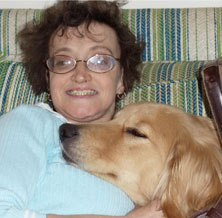
Beth
Beth

Beth, who has cerebral palsy and has struggled with depression for more than 20 years, bonds with her service dog, Somer. While Somer’s official “job” is to help Beth walk and assist her if she falls, she also helps Beth keep her spirits up and overcome her depression.
Beth was 20 years old when she entered Community Hope following hospitalizations for depression and years of struggling to fit in with the stigmas of physical, mental and learning disabilities. Beth’s family was desperate for a program that would allow her to leave the hospital and get the help she needed.
Two decades later, she has come further than she imagined! She earned an A.A. degree in 2002, and completed her B.A. degree in 2008. After an internship at the Historic Speedwell Museum in Morristown, where she still volunteers, Beth now assists others in finding jobs through Morris County’s one stop employment center.
She has progressed in her recovery to our independent living program, sharing a home with two roommates since 1998. “My home is here,” she told her parents when they were planning to retire and move out of state ten years ago. “If I had not been in Community Hope, I would have been forced to relocate. Now, my parents have their life and I have mine and that is as it should be.”
“When I’m depressed or stressed, the dog shuts down too. So I have to keep myself in check and keep my spirits up for Somer. If something happened to me and I had to go into the hospital, what would happen to my dog? So I have to stay grounded.”
– Beth
Inspired by the story of a wounded Post 9/11 soldier whose recovery was aided by a service dog, Beth recently underwent an intensive training course to acquire her new service dog, nicknamed Somer for Somerset. “She assists me with balance and helps me walk,” said Beth as Somer slept at her feet. “She knows over 80 commands and has been able to help me up when I have fallen.” Her golden retriever helps her navigate her way to her volunteer jobs and the employment center, where she sleeps under the desk while Beth works.
Beth attributes Somer with urging her to work harder to overcome her struggle with depression. “When I’m depressed or stressed, the dog shuts down too. So I have to keep myself in check and keep my spirits up for Somer. If something happened to me and I had to go into the hospital, what would happen to my dog? So I have to stay grounded.”
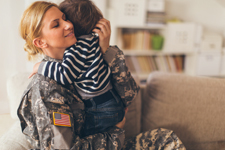
*Sharon, Iraq War Veteran
*Sharon, Iraq War Veteran
 In 2008, Sharon joined the Army. She served for three years and was deployed for one year in Iraq where she was assigned to 92 Alpha as an automated logistical expert. She provided critical support to her “battle buddies”, ensuring that Army forces had the vital equipment, parts and supplies to keep their combat outpost and medical unit running efficiently.
In 2008, Sharon joined the Army. She served for three years and was deployed for one year in Iraq where she was assigned to 92 Alpha as an automated logistical expert. She provided critical support to her “battle buddies”, ensuring that Army forces had the vital equipment, parts and supplies to keep their combat outpost and medical unit running efficiently.
Fortunately, Sharon’s tour of duty did not leave the kind of battle scars and trauma that other veterans suffered, but it did toughen her resolve and resilience. In July of this year, Sharon and her two young sons moved from Colorado to our area to care for her ailing grandmother. With no job and little but the clothes on their backs, Sharon was desperate to find affordable housing and get her sons settled in a safe place. “It was difficult trying to find a place to stay out here.” Motels were expensive and she was running out of funds.
“I just wanted to get help. I didn’t want my kids to be on the streets.”
Homeless and living out of her car, she found the local VA Clinic and Community Hope’s new Veterans Drop In Center. “I just wanted to get help. I didn’t want my kids to be on the streets.” Our team provided emergency housing placement in a motel for Sharon and her sons that same day and secured an apartment for her two weeks later, providing financial assistance that included the security deposit, initial rent and beds for the family. We also helped her locate other community resources for the furnishings and basic household supplies she needed. She’s now looking for a job and hopes to return to school. “My case manager at Community Hope was very caring and understanding. She helped us get back on our feet.”
*Not veteran’s actual photo or name
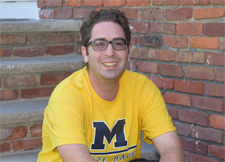
Scott
Scott
 Life was pretty good for Scott growing up. He was the older of two boys– “the quiet one”. He enjoyed school, particularly math and science, and played soccer. But things soon changed for Scott. He would endure an unexpected journey with mental illness-a word that still harbors a societal stigma that can make recovery for young adults very challenging.
Life was pretty good for Scott growing up. He was the older of two boys– “the quiet one”. He enjoyed school, particularly math and science, and played soccer. But things soon changed for Scott. He would endure an unexpected journey with mental illness-a word that still harbors a societal stigma that can make recovery for young adults very challenging.
The voices started when he was just 11 years. Somehow he figured out how to manage them. Then things got worse at 19. Freshman year at college was good, but life changed drastically in his sophomore year. The voices came back, he couldn’t sleep and he was hallucinating. “I knew something was wrong, but I couldn’t do anything about it.” So the long journey of therapists, inpatient hospital stays, respite care and medications began. He was living with family but Scott’s behaviors baffled them, so he decided to leave, but where could he go?
“Community Hope is helping me build skills so I can live on my own.”
Community Hope’s Supportive Living Program was his savior. Scott is entering his ninth year as one of four residents living in one of our supportive living homes. He says “I’m not where I want to be yet, but I’m semi-independent and I’ve gotten a lot better. I am on the right medications and I have a part time job as a group facilitator”.
Being in this peer counseling role is enabling Scott to share his experiences and success to help others find the road to recovery. He has learned from his Community Hope support staff that recovery is a process and that he has had to have greater patience with himself. “Community Hope is helping me build skills so I can live on my own.”
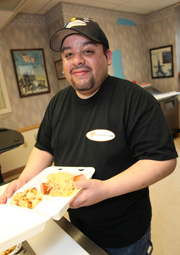
Steven, Afghanistan-Iraq War Veteran
Steven, Afghanistan-Iraq War Veteran

Steven at work at the Fox Hole Cafe
Photo by Brian Gallagher
Steven proudly served his country for more than nine years, enlisting in the U.S. Navy when he was 17. He served two tours each in both Iraq and Afghanistan. Rising to the rank of Second Class Petty Officer, he oversaw 30 cooks and was responsible for feeding 3,000 servicemen and women four times a day. He also saw conflict while transporting Marines and Special Forces into war zones.
By 2006, after completing four tours of duty, he began experiencing anxiety and paranoia. “I didn’t know what was wrong with me,” Steven explains. He said as the symptoms escalated, he turned to the only thing that seemed to help. Steven now knows that marijuana was a self-medication for the paranoid schizophrenia he would later be diagnosed with, but didn’t realize it until he reached rock bottom. Unable to work, he found himself homeless and destitute until entering a VA short-term residential and recovery program.
Steven then transferred to Community Hope’s Hope for Veterans® Program where he now works at an on-campus cafe and receives wrap-around services. As he plans to graduate from the program, Steven’s case manager will be helping him search for his own apartment. Today, He is optimistic about his future and hopes to pursue a college degree.

